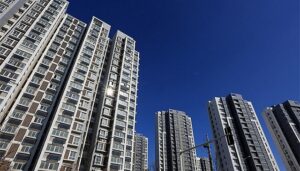>>REAL-TIME UPDATES IN THE WIRE. CLICK HERE<<<
Several Chinese cities have suspended or relaxed a measure to set reference prices for second-hand homes which was aimed at curbing property speculation, in the latest round of property policy easing to support the struggling housing markets.
Since the tech hub of Shenzhen introduced the reference price mechanism in February 2021, a total of 15 cities had introduced similar measures, under which, banks grant mortgage loans based on the reference prices and that affects the amount of mortgage loans homebuyers can get.
According to information compiled by the China Real Estate Information Corporation (CRIC),13 of the cities have so far removed or relaxed the mechanism.
The 13 cities include Chengdu, Ningbo, Shaoxing, Guangzhou, Dongguan, Jinhua, Wenzhou, Hefei, Quzhou, Beijing and Wuxi, leaving only Shenzhen and Shanghai currently with the measure in place.
Xi’an, capital of northwestern China’s Shaanxi province, become the first city to officially suspend the measures. On July 4, the city’s housing regulator said that it had suspended publishing second-hand reference prices and properties’ listing prices on real estate platforms could be based on home sellers willingness or actual transactions prices.
Before Xi’an, some cities had relaxed the mechanism. For instance, in the city of Chengdu, capital of northwestern China’s Sichuan province, mortgage loans from banks have been granted based on appraised value instead of the government’s reference prices, though mortgage loans from the government-run Housing Provident Fund are still based on reference prices.
In Guangzhou and Dongguan, while properties’ listing prices are still under restrictions of the reference prices, transactions prices and mortgage loans are no longer impacted by the reference prices. In Wenzhou and Hefei, local regulators never released details for the implementation of the measures after announcing the policy.
The suspension of the reference price mechanism came after second-hand transactions has cooled notably. In Shenzhen, second-hand home transactions reached 872 units in February, one year after the policy was introduced, slumping 76.5% from a year earlier and hitting the lowest in 15 years, according to the city’s official home transaction platform.
The relaxation of the reference policy mechanism is a signal of the regulators’ intention to boost liquidity of second-hand homes and rebuild confidence in the housing market, said Ding Zuyu, director of the E-House China R&D Institute.
Second-hand transactions on some cities has shown some pickup after policy easing. For instance, second-hand transactions in the city of Suzhou surged 61% on year in the week of July 11 – 17 and by 36% on year in the week of July 18 – 24, according to data from the China Real Estate Information Corporation.
Notably, data from the Shanghai-based E-House China R&D Institute shoed that second-hand transactions in 14 major cities reached about 72,000 units in July, falling by 5.5% from the previous month, but rising 2.3% from a year earlier, the first year-on-year growth after sliding 13 months. In particular, second-hand transactions in Chengdu exceeded 17,000 units to hit the highest since January 2012.
Data from Beike Research Institute showed that, the index for second-hand home transaction volume in China’s 50 major cities stood at 40 in July, rising slightly from the previous month and higher than 39 a year earlier, marking the first year-on-year growth since May last year.
In particular, the index for nearly half of the cities including Dongguan, Langfang, Beijing, Shanghai and Tianjin rose in July from the previous month, and the index for more than 60% of the cities, including Ningbo, Taiyuan, Zhengzhou, Nanjing an Suzhou, exceeded the year-ago level, according to Beike Research .
Looking ahead, second-hand home markets are expected to maintain the recovery momentum, with markets in key cities are expected to recover earier than new home markets, said Ding.
Overall speaking, the real estate market is still in downturn and it will take more time for a sector-wide recovery, and more local governments may introduce more innovative measures to boost property sales, said Chen Wenjing, market research director at China Index Academy.

